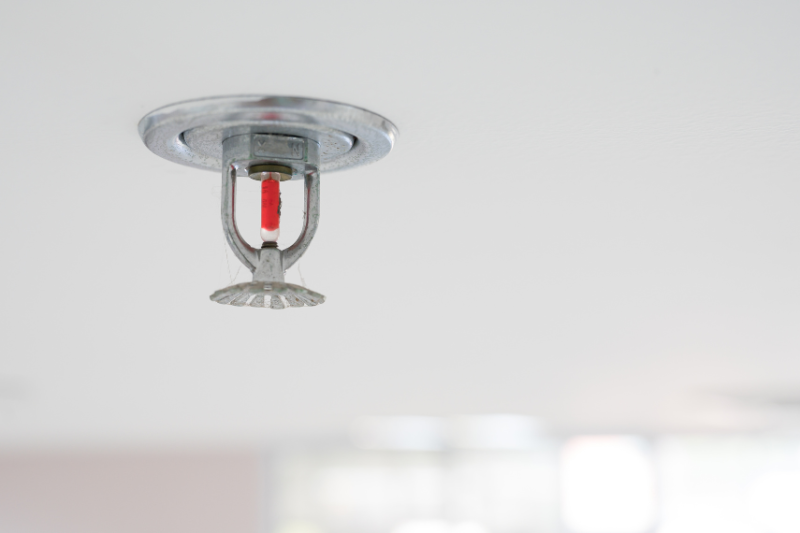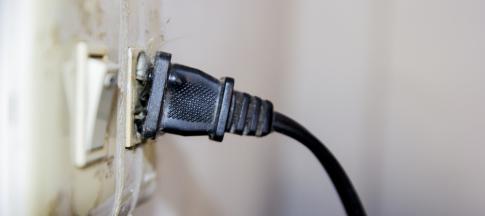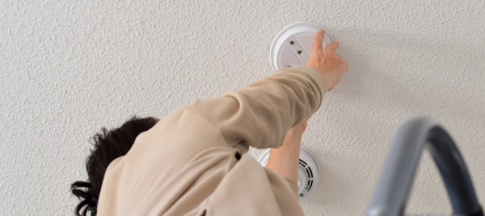
Fire safety is an important part of being a homeowner, landlord, or tenant. We discuss how sprinklers work, how they should be maintained and the myths around them.
What is a fire sprinkler system?
Fire sprinkler systems in houses are made up of:
- A water supply, either from a tank or the mains supply (sometimes with a pump)
- A sprinkler stop valve, which should be kept open to make sure the water can get through to the sprinklers when required
- Hidden pipes that carry the water to the sprinklers
- Sprinkler heads throughout the house, generally hidden behind circular plates in the ceiling
- An alarm
Sprinkler myths explained
Here are some common misconceptions about how sprinklers work.
1. If there’s a fire, will it set off all the sprinklers?
This is one of the most common misconceptions as it’s seen so often in films.
Nigel Chantler, Chairman of the Residential Sprinkler Association, said: “An actor in an action film might hold a cigarette up to a sprinkler and set them all off throughout the building, which just doesn’t happen.”
If there’s a fire only the sprinklers by the fire will go off – and that’s normally one sprinkler head.
2. What if I set my sprinklers off accidentally?
There’s no way of setting off fire sprinklers accidentally and you definitely can’t use an app to switch them on.
Sprinklers are only set off when the air temperature reaches the “operation temperature”, which is between 68°C and 72°C. Temperatures this high can't be reached without something specific causing more heat than usual.
One thing you should bear in mind if you’re decorating is that wallpaper strippers release steam hot enough to operate a sprinkler, so keep them away from the sprinkler heads.
3. Can the heat from cooking set off my sprinklers?
No, fire sprinklers can’t be set off by the heat from cooking, burnt toast, or the steam from your shower.
The only thing that will set a sprinkler off (unless there’s a fault) is the air hitting the operation temperature.
4. Won’t the water damage from sprinklers be worse than fire damage?
Sprinklers only cause a small amount of water damage. Generally, furniture and carpets will dry out, and the only requirement will be to redecorate the walls where needed.
Nigel commented: “The sprinkler head puts the fire out so quickly, there’s often very little damage other than a black mark on the ceiling and a little water on the floor and surfaces.”
Fire damage would be more serious and likely to spread further, not to mention being life-threatening. The Fire Service would use a lot more water to put out a fire, making the possible water damage that much worse.
How do fire sprinkler systems work?
If there’s a fire and the air temperature increases to between 57°C and 62°C, the circular plate over the nearest sprinkler head detaches and the sprinkler drops down.
If the heat rises above 68-72°C then the sprinkler operates.
Only the sprinkler(s) in the immediate vicinity of the fire will operate, spraying water below it to contain or put out the fire.
The benefits of having a sprinkler system
The benefits of sprinkler systems are straightforward.
Sprinklers stop a fire taking hold and spreading elsewhere in a house and by putting fires out quickly, they lessen the amount of damage caused.
Sprinkler system care and maintenance
There’s actually very little work involved in looking after your sprinkler system but there are three things you should bear in mind. Firstly, make sure you never turn off the sprinkler stop valve.
Secondly, be careful when painting your ceiling – don’t paint over the circular plates where the sprinkler heads sit. This could prevent the sprinkler heads from dropping when a fire is detected.
Lastly, although it’s not mandatory, it’s recommended that you book an annual service with a qualified engineer to make sure everything is in working order.
Nigel added: “People are often unsure how much work is involved in having a sprinkler system. Once it’s installed, you don’t need to touch it, but it should be serviced once a year by a qualified engineer.”
The engineer will:
- test the water supply works as designed
- check for leaks
- make sure the sprinkler system works as designed, hasn’t been modified or obstructed in any way (such as being painted over), and that there have been no building works that would call for modifications to the sprinkler system
- check all alarms
Other fire safety tips
Here’s our quick guide to fire safety in the home:
- Work out the quickest and easiest escape route, and always keep it clear.
- Test your smoke alarms regularly.
- Check your appliances are switched off before going to bed or going out.
- Take care when cooking and don’t leave pans unattended.
- Close all doors before going to bed or going out.
- At the first sign of a fire, get to safety (ideally out of the home) and call 999.
For a more in depth look at fire safety, take a look at our guide on house fire prevention and safety.


